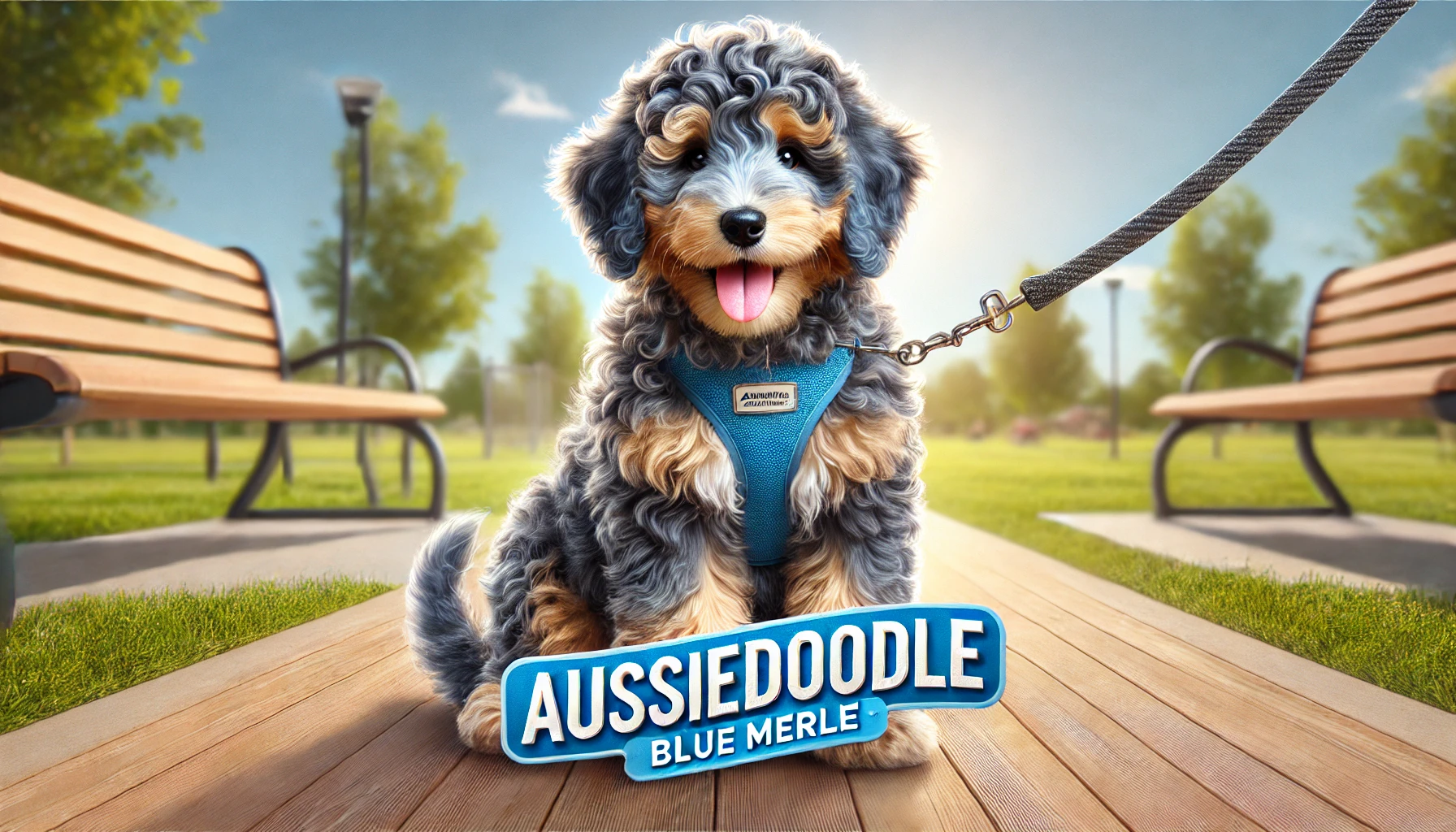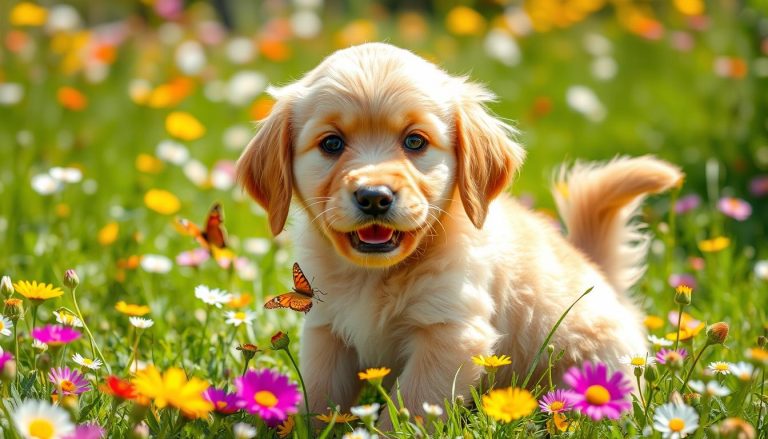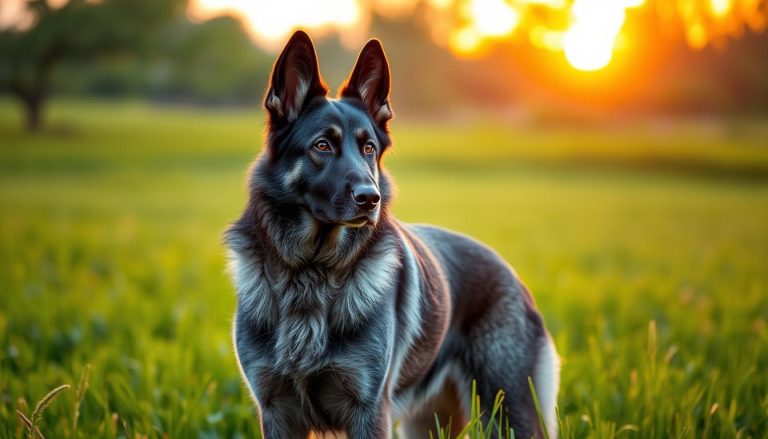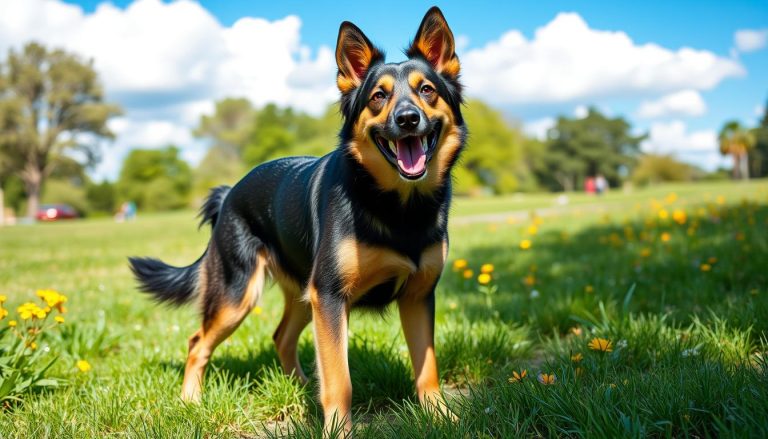Aussiedoodle: Size, Behavior, Health, Temperament and Cost
Aussiedoodles have quickly gained popularity as a beloved designer breed, known for their intelligence, affectionate nature, and striking appearance. This hybrid dog, a mix of the Australian Shepherd and Poodle, combines the best traits of both parent breeds. Renowned for being friendly and adaptable, Aussiedoodles make excellent family pets and companions. Their relatively low-shedding coats, playful personalities, and loyalty to their owners have made them a top choice for families, singles, and seniors alike.
In this article, we will dive deep into the characteristics that make Aussiedoodles unique, covering everything from their physical traits and temperament to their health needs and training requirements. By the end, you’ll have a complete picture of whether an Aussiedoodle might be the perfect addition to your family.
Table of Contents
1. Aussiedoodle Overview
What is an Aussiedoodle?
An Aussiedoodle is a crossbreed between an Australian Shepherd and a Poodle, combining the intelligence and curly coat of the Poodle with the energy and work ethic of the Australian Shepherd. This pairing creates a breed that is not only smart and eager to learn but also highly affectionate and friendly.
With a rich heritage that draws on the best qualities of both parent breeds, Aussiedoodles are known for their loyalty, playfulness, and adaptability. Their personality and appearance can vary depending on factors like the size and type of Poodle parent, but they typically retain the best attributes of both breeds.
Breed Origins: The Australian Shepherd and Poodle Mix
The Aussiedoodle is relatively new as a crossbreed, with origins tracing back to the growing trend of “designer” dog breeds in the late 20th century. However, its parent breeds have long and respected histories.
- Australian Shepherd: The Australian Shepherd, often called the “Aussie,” was originally bred to work as a herding dog, prized for its agility, intelligence, and loyalty. Despite its name, the breed was refined in the United States and is highly regarded for its herding abilities, endurance, and work ethic.
- Poodle: The Poodle is known for its intelligence, hypoallergenic coat, and versatility. Originally bred in Germany as a water retriever, Poodles come in three main sizes (Standard, Miniature, and Toy) and are known for their trainability and hypoallergenic coats.
The mix of these two breeds brings together the best qualities of each: the intelligence and hypoallergenic coat of the Poodle with the energy, loyalty, and trainability of the Australian Shepherd.
Types of Aussiedoodles
Aussiedoodles are typically available in three main sizes, depending on the type of Poodle used in breeding:
- Standard Aussiedoodle: A cross between an Australian Shepherd and a Standard Poodle. Standard Aussiedoodles are the largest of the types, often weighing between 40 to 70 pounds and standing 19 to 24 inches tall at the shoulder.
- Mini Aussiedoodle: Created by breeding a Miniature Poodle with an Australian Shepherd. Minis generally weigh between 15 to 35 pounds and stand around 12 to 18 inches tall.
- Toy Aussiedoodle: The Toy variety is the smallest, resulting from a mix between a Toy Poodle and a smaller Australian Shepherd. Typically weighing under 15 pounds, these little dogs are perfect for those seeking a compact companion.
The different sizes make this breed adaptable to a range of living spaces, from large homes with yards to cozy city apartments.
If you’re considering a family-friendly dog, you might also like to read about Mini Golden Retrievers: Everything You Need to Know Before Bringing One Home and Golden Mountain Dog: A Loyal, Friendly Companion, both of which are known for their affectionate temperaments and adaptability.
2. Aussiedoodle Physical Traits
Aussiedoodle Size and Weight
Aussiedoodles come in a range of sizes, allowing them to adapt to different living situations and owner preferences. The final size of an Aussiedoodle often depends on the size of the Poodle parent.
- Standard Aussiedoodles: These Aussiedoodles are the largest, typically weighing between 40 and 70 pounds and reaching heights of 19 to 24 inches at the shoulder.
- Mini Aussiedoodles: Minis are a great middle-ground size, usually weighing between 15 to 35 pounds and standing around 12 to 18 inches tall.
- Toy Aussiedoodles: The smallest type, Toy Aussiedoodles usually weigh under 15 pounds and reach heights of 10 to 12 inches.
The variety in size options makes Aussiedoodles versatile pets, suitable for both apartment living (Toy and Mini) and larger homes (Standard).
Aussiedoodle Coat and Shedding
One of the most desirable traits of Aussiedoodles is their low-shedding coat, inherited from their Poodle lineage. Aussiedoodles may have wavy, curly, or straight coats, with the curlier coats generally shedding less. While not completely hypoallergenic, Aussiedoodles shed significantly less than many other breeds, making them a good option for allergy sufferers.
- Wavy Coats: Wavy coats are the most common in Aussiedoodles and are usually low-shedding. They may require regular brushing to prevent tangling but are generally easy to maintain.
- Curly Coats: Curly coats are more similar to the Poodle’s coat and tend to shed the least. These Aussiedoodles are closest to hypoallergenic but require more grooming to avoid matting.
- Straight Coats: Aussiedoodles with straight coats may shed a bit more, especially if they inherit more of the Australian Shepherd’s genes. Straight coats are often easier to groom but may need more frequent brushing.
Color Variations
Aussiedoodles come in a wide range of beautiful coat colors and patterns, often a blend of both parent breeds’ coat colors.
- Merle: One of the most striking patterns, merle Aussiedoodles have a mottled coat with patches of different colors, often combined with blue or green eyes.
- Solid Colors: Solid colors like black, brown, or white are also common, with each color being equally popular among Aussiedoodle enthusiasts.
- Bi-Color and Tri-Color: Many Aussiedoodles display two or three distinct colors, often black and white or brown and tan. These patterns give Aussiedoodles a unique, eye-catching appearance.
With such a variety of coat colors and patterns, Aussiedoodles are as visually stunning as they are friendly and affectionate.
3. Temperament and Personality
General Temperament
Aussiedoodles are known for their friendly, intelligent, and sociable temperament. They are highly adaptable, making them suitable for various lifestyles, whether it’s an active family or a single individual looking for a loyal companion. Aussiedoodles typically inherit the best qualities of their Poodle and Australian Shepherd parents, resulting in a dog that is eager to please and easy to train.
- Intelligence: Aussiedoodles are extremely intelligent, thanks to the influence of both parent breeds. They pick up commands quickly, making them easy to train.
- Friendliness: These dogs are known to be friendly and social, often enjoying the company of both people and other pets. Their approachable nature makes them a great fit for families, as well as a good companion for children.
- Adaptability: Aussiedoodles can adapt to various living conditions, provided they receive enough exercise and mental stimulation. This adaptability makes them suitable for both city living and rural homes.
Aussiedoodle Personality
The personality of an Aussiedoodle is a delightful mix of playfulness, affection, and loyalty. They are known for their “velcro” behavior, often sticking close to their family members and forming strong bonds.
- Playfulness: Aussiedoodles are playful and enjoy interactive games, especially with children or other dogs. They are always up for a game of fetch or a run in the yard.
- Affectionate: Aussiedoodles are highly affectionate dogs, often seeking out cuddles and physical closeness with their owners. They are loyal companions and enjoy spending time with their family.
- Loyalty: Aussiedoodles form strong attachments and tend to be loyal to their families. This loyalty makes them excellent watchdogs, alerting owners of any unusual activities around the home.
These personality traits make Aussiedoodles a great choice for families and individuals alike, as they bring joy, energy, and companionship into the home.
Cuddly or Independent?
Aussiedoodles are typically known for being affectionate and cuddly. They form close bonds with their families and enjoy physical closeness, often following their owners around the house. This makes them a great choice for anyone looking for a companion dog that enjoys being near its human family.
While they’re generally affectionate, Aussiedoodles can also be independent when properly trained. They enjoy having their own space, especially after a long day of play or exercise.
Calm or Energetic?
Aussiedoodles are generally energetic dogs, particularly in their puppy and adolescent stages. They require regular exercise and mental stimulation to keep them happy and healthy. However, once they receive their daily exercise, they tend to be calm and relaxed indoors.
- Exercise Requirements: Aussiedoodles typically need around 60 to 90 minutes of exercise each day. This can include walks, playtime, and interactive games that challenge them mentally and physically.
- Mental Stimulation: Given their intelligence, Aussiedoodles benefit from activities that engage their minds, such as training exercises or puzzle toys.
If their energy needs are met, Aussiedoodles can be calm and well-mannered inside the home, making them adaptable to a variety of living situations.
4. Behavior and Training
Behavior Problems in Aussiedoodles
Aussiedoodles are generally well-behaved, but as with any intelligent, high-energy breed, they can develop certain behavioral issues if their needs aren’t fully met. Here are some of the most common behavior problems seen in Aussiedoodles, along with tips on how to address them:
- Separation Anxiety: Aussiedoodles form strong bonds with their families and may become anxious when left alone for long periods. Signs include whining, pacing, or destructive behavior. To alleviate separation anxiety, gradually get them used to being alone by leaving them for short periods and slowly extending the time. Interactive toys or treat-dispensing puzzles can help keep them occupied in your absence.
- Excessive Barking: Due to their Australian Shepherd ancestry, some Aussiedoodles are prone to barking, especially if they are bored or feel the need to alert their owners to every sound. Early training is crucial in teaching them when barking is appropriate. Redirect their attention with a command like “quiet” and reward them for following through.
- Herding Instincts: Aussiedoodles may occasionally exhibit herding behaviors, such as nipping at heels, particularly in children. This instinct comes from their Australian Shepherd lineage. Redirection techniques, along with positive reinforcement, can help manage these behaviors. Engaging them in herding games or agility exercises also provides an outlet for this natural inclination.
- Hyperactivity: Aussiedoodles are active dogs with high energy levels. If they don’t receive enough exercise, they may become restless and exhibit hyperactive behaviors. Structured play, long walks, and puzzle games that challenge their minds can help reduce hyperactivity and encourage calmness.
By providing consistent training, early socialization, and ample opportunities for mental and physical engagement, Aussiedoodle owners can effectively address and manage these behaviors.
Aggressiveness in Aussiedoodles
Aggressiveness is uncommon in Aussiedoodles, who are typically friendly, social, and gentle. However, any dog can show aggression if it feels threatened, fearful, or unwell. Early socialization plays a significant role in minimizing aggressive tendencies by helping them become comfortable in a variety of environments and with new people and animals.
- Socialization: Introducing your Aussiedoodle to different situations, people, and other animals from an early age can significantly reduce any tendencies toward fear-based aggression. This process helps build confidence and trust.
- Understanding Triggers: Some Aussiedoodles may show possessiveness over their food, toys, or favorite people. Identifying these triggers and working with a trainer can help manage any resource-guarding tendencies.
- Positive Reinforcement: Aussiedoodles respond well to positive reinforcement training methods. Using treats, praise, and rewards encourages good behavior and creates a positive association with social situations.
Overall, with proper training and socialization, aggression is rare in Aussiedoodles, making them a good choice for families with children or other pets.
Training Tips for Aussiedoodles
Thanks to their intelligence and eagerness to please, Aussiedoodles are highly trainable dogs. They excel in obedience training, agility, and even tricks, making them an excellent choice for owners interested in an interactive, trainable dog.
- Basic Obedience: Start with fundamental commands such as sit, stay, come, and heel. Aussiedoodles are quick learners, especially when trained using positive reinforcement techniques.
- Socialization Training: Socialization is critical for Aussiedoodles to grow into confident, well-adjusted adults. Exposure to various environments, sounds, people, and animals can reduce the likelihood of fear-based behaviors later on.
- Advanced Training and Agility: Aussiedoodles thrive in environments that challenge them mentally. Advanced training, including agility courses or complex tricks, keeps them engaged and provides mental stimulation.
- Consistency and Patience: Aussiedoodles are highly responsive to consistent training. Use short, frequent training sessions and keep instructions clear to avoid confusion.
Because Aussiedoodles are so intelligent, they can sometimes become bored with repetitive training. Incorporate variety in their training routine, mixing obedience with agility, trick training, and play.
5. Health and Lifespan
Average Lifespan of an Aussiedoodle
The average lifespan of an Aussiedoodle ranges between 10 to 14 years, with some reaching even older ages with good care. Their lifespan can be influenced by factors such as genetics, diet, exercise, and routine veterinary care.
- Genetic Factors: Aussiedoodles inherit a combination of traits from both parent breeds, which can impact their overall health. Responsible breeders conduct genetic testing on parent dogs to minimize the risk of hereditary health issues.
- Routine Care: Regular check-ups with a veterinarian are essential to monitor for any health issues and ensure vaccinations and preventative care are up-to-date.
- Diet and Exercise: A balanced diet and consistent exercise regimen contribute to a healthy, long life for Aussiedoodles. Proper nutrition and activity levels support their overall health, reduce obesity, and enhance quality of life.
Common Health Issues in Aussiedoodles
Like all breeds, Aussiedoodles can be prone to certain health issues, some of which may be inherited from their parent breeds. Knowing about these potential issues allows for proactive care and early intervention.
- Hip Dysplasia: Hip dysplasia is a common condition in medium to large dogs, including Standard Aussiedoodles. This condition occurs when the hip joint doesn’t fit correctly, leading to arthritis and discomfort. Regular exercise, a balanced diet, and weight management can help reduce the risk.
- Progressive Retinal Atrophy (PRA): PRA is an inherited condition that causes gradual vision loss due to the deterioration of the retina. Regular eye exams can help monitor for signs of this condition. Responsible breeders test for PRA to prevent it in their breeding lines.
- Allergies: Aussiedoodles can be prone to allergies, which may manifest as skin irritations, itchiness, or digestive upset. These allergies can be due to food sensitivities or environmental allergens like pollen or dust. Veterinary guidance on diet and care can help manage symptoms.
- Epilepsy: Some Aussiedoodles may develop epilepsy, a neurological condition that causes seizures. With proper diagnosis and medication, epilepsy can often be managed, allowing the dog to lead a relatively normal life.
- Hypothyroidism: This condition affects the thyroid gland and can lead to symptoms such as weight gain, lethargy, and coat changes. Hypothyroidism is manageable with medication, and regular veterinary check-ups can help monitor thyroid levels.
Exercise and Activity Needs of Aussiedoodles
Aussiedoodles are active and energetic dogs, requiring regular exercise to stay happy and healthy. Their Australian Shepherd lineage contributes to their high energy levels, while the Poodle influence brings intelligence and a need for mental stimulation.
- Daily Walks: Aussiedoodles benefit from at least one to two walks per day, depending on their size and energy level. A standard Aussiedoodle may require longer or more frequent walks compared to a mini or toy.
- Playtime: Engage your Aussiedoodle in games like fetch, frisbee, and tug-of-war. These activities provide physical exercise and an opportunity to bond with your dog.
- Mental Stimulation: Aussiedoodles are highly intelligent, so they thrive on mental challenges. Puzzle toys, training exercises, and agility activities can keep them mentally engaged and prevent boredom.
- Agility and Herding Games: Given their heritage, Aussiedoodles enjoy agility training and games that mimic herding behavior. Agility courses can help burn off energy while satisfying their natural instincts.
Regular physical and mental exercise is key to keeping an Aussiedoodle happy and calm. Without adequate exercise, Aussiedoodles can become restless and develop unwanted behaviors like excessive barking or chewing.
Keeping your dog healthy and active is crucial for longevity. If you’re interested in learning more about health care for other breeds, see our guides on Golden Mountain Dog Puppies: A Perfect Blend of Temperament and Beauty and Brindle Pitbull: Complete Guide on Cost, Temperament, Size, Lifespan, Bloodline, and Types.
6. Cost and Buying Guide
Aussiedoodle Cost
Owning an Aussiedoodle involves an initial purchase price as well as ongoing expenses for care and maintenance. Here’s an overview of the expected costs:
- Initial Purchase Price: Aussiedoodles from reputable breeders typically cost between $1,500 and $4,500. The price can vary based on factors like size (Mini Aussiedoodles are often priced higher due to their popularity), breeder reputation, and geographic location.
- Annual Care Costs: The annual cost of owning an Aussiedoodle includes expenses like grooming, vet visits, food, and training. Expect to budget around $500 to $1,000 annually for regular veterinary care alone.
- Grooming Costs: Aussiedoodles require regular grooming, which can cost between $50 and $100 per session. Since Aussiedoodles benefit from grooming every 6–8 weeks, grooming costs can add up over time.
- Food Costs: Quality dog food is essential for maintaining an Aussiedoodle’s health. Depending on size and dietary needs, food costs may range from $40 to $80 per month.
Where to Buy Aussiedoodle Puppies
Finding a reputable breeder is critical to ensuring a healthy, well-socialized Aussiedoodle. Here are some steps to help locate a responsible breeder:
- Research Reputable Breeders: Look for breeders with good reputations and positive reviews. Online forums, breed-specific organizations, and recommendations from veterinarians can guide you to reputable breeders.
- Health Screenings: Reputable breeders provide health screenings and certifications for both parent dogs, reducing the risk of genetic health issues. Always ask for documentation on health checks, especially for conditions like hip dysplasia and PRA.
- Visit the Breeder: If possible, visit the breeder’s facility to see where the puppies are raised. Reputable breeders keep their dogs in clean, comfortable conditions and are transparent about their breeding practices.
- Read the Contract: A responsible breeder will provide a health guarantee and a contract outlining the puppy’s care requirements. Reviewing this document ensures you understand the terms before making a commitment.
Aussiedoodles for Sale: What to Consider
Bringing this breed into your home is a big commitment, so it’s important to assess whether their needs align with your lifestyle and living situation.
Size and Space Requirements: Decide if a Standard, Mini, or Toy size would suit your home best. Larger dogs may need a home with a yard, while Mini and Toy varieties often adapt well to apartment life.
Energy Levels: These dogs are energetic and require regular exercise. Make sure your schedule allows for daily walks, playtime, and mental stimulation to keep them happy and balanced.
Financial Commitment: Beyond the initial purchase price, ongoing costs for grooming, food, and veterinary care are essential to maintain their health and well-being. Be prepared for these recurring expenses.
By considering these factors carefully, potential owners can decide if this breed is the right match for their lifestyle.
7. Aussiedoodle as a Family Pet
Aussiedoodle Compatibility with Families
This breed is often praised for its friendly and social nature, making it an ideal choice for families. They tend to bond closely with every family member, from young children to adults, and they generally interact well with other pets. Here’s why they make fantastic family companions:
Gentle with Children: Known for their gentle, patient, and playful temperament, they’re well-suited for households with kids. They enjoy playtime with children and often have a natural instinct to protect them. However, as with any dog, interactions with young children should be supervised for safety.
Friendly with Other Pets: These dogs usually get along well with other pets, including cats, when properly introduced. Their sociable and playful personality often leads to close friendships with other animals in the home. Early socialization helps them learn boundaries and develop respectful behavior with other animals.
Watchful and Alert: They tend to be alert and aware of their surroundings. While they’re not typically aggressive, they will notify their owners of anything unusual, which makes them effective watchdogs. This trait provides added reassurance for families, particularly those with children.
Their loyalty, playful energy, and affectionate nature make them an excellent fit for family environments where they can receive the attention and love they thrive on.
Living Environment: Aussiedoodles in Apartments vs. Larger Homes
The versatility of Aussiedoodles allows them to adapt well to various living environments. The size of this breed can influence the best home environment:
Apartment Living: Mini and Toy varieties are often well-suited for apartment life, as long as they receive daily exercise and mental stimulation. In an apartment setting, frequent walks and play sessions help burn off their energy.
Homes with Yards: For larger ones, such as the Standard size, having access to a yard or outdoor space is ideal. A yard gives them the freedom to run and play, but it’s no replacement for structured exercise, which is essential to keep them content and balanced.
Rural vs. Urban Environments: They can adapt well to both rural and urban settings. In rural areas, they enjoy the extra space to roam and explore, which satisfies their natural curiosity. In urban settings, daily walks, visits to dog parks, and indoor games are key to keeping them happy.
No matter the living environment, the most important factor for their well-being is regular physical and mental engagement. When properly exercised, they’re likely to be calm and well-behaved indoors, even in smaller spaces.
Aussiedoodle’s Adaptability to Different Lifestyles
Known for their adaptable nature, this breed can thrive in different lifestyles. Whether you’re an outdoor enthusiast or a family with a more laid-back routine, they can fit in well as long as their core needs are met.
Active Lifestyles: These dogs are an excellent match for individuals or families who enjoy an active lifestyle. They’ll eagerly join in activities like hiking, running, and outdoor adventures, thanks to their stamina and energy.
Homebodies and Relaxed Environments: They can also settle into quieter settings if they receive sufficient daily exercise. In more relaxed households, they’re content to be calm and affectionate, happy to cuddle on the couch or lounge with family. Their adaptable nature means they’ll mirror your energy level, as long as they stay physically and mentally engaged.
Travel Compatibility: Many are good travel companions and adjust well to car rides, making them suitable for families who enjoy taking their pets on trips. Their friendly disposition allows them to adapt smoothly to new places and experiences.
This flexibility makes them an ideal choice for people with varying lifestyles, as they can shift between being an energetic adventure buddy and a calm, affectionate companion at home.
8. Training Techniques and Mental Stimulation
Importance of Mental Stimulation for Aussiedoodles
This highly intelligent breed requires consistent mental stimulation to stay engaged and content. Without enough activity, they may develop undesirable behaviors like chewing, digging, or barking out of boredom. Here are some effective ways to keep them mentally stimulated:
Puzzle Toys: Toys that hide treats or require problem-solving are ideal, as they challenge your pet’s mind and reward their efforts, keeping them both entertained and satisfied.
Training Sessions: Regular training not only enhances obedience but also engages their minds. Introducing new commands or tricks keeps sessions exciting and mentally stimulating. They love to learn and respond well to positive reinforcement, making training enjoyable and effective.
Interactive Games: Activities like hide-and-seek, fetch, and scent-tracking exercises provide both mental and physical stimulation. These games satisfy natural curiosity and help prevent boredom.
Agility Courses: With their quick learning ability and agility, they excel in agility training. Setting up a small agility course at home or attending agility classes offers excellent mental and physical exercise, channeling their energy productively.
Effective Training Techniques for Aussiedoodles
With their high intelligence, this breed responds well to structured training. Here are a few effective techniques:
Positive Reinforcement: These dogs thrive on positive reinforcement, where good behavior is rewarded with treats, praise, or play. Avoid harsh corrections or punishment, as they tend to be sensitive and may react poorly to overly strict methods.
Short, Consistent Sessions: While they have a good attention span, keeping training sessions brief (10–15 minutes) helps sustain their focus. Frequent, shorter sessions are often more effective than longer ones.
Socialization Training: Socialization is key to fostering well-rounded behavior. Introduce them to various people, animals, and settings early on to build confidence and ease in new situations.
Leash Training: Due to their active nature, they may sometimes pull on the leash. Teaching loose-leash walking from an early age establishes boundaries and makes walks more enjoyable.
Training can be a fun bonding experience, and their enthusiasm and intelligence make them quick learners. With the right approach, they can excel in both obedience and agility.
9. Grooming Needs for Aussiedoodles
Understanding the Aussiedoodle Coat
One of the most distinctive features of this breed is its coat. These dogs inherit a blend of coat types from their Poodle and Australian Shepherd lineage, resulting in a variety of textures, from wavy to curly or straight. Grooming needs vary based on the specific coat type.
Wavy Coat: This is one of the most common types and generally sheds minimally. Regular brushing helps prevent tangles and mats.
Curly Coat: Dogs with curly coats are often the closest to hypoallergenic, making them popular for allergy-sensitive owners. However, curly fur is prone to matting and requires more frequent brushing and professional grooming every 6–8 weeks.
Straight Coat: The straight coat, similar to that of the Australian Shepherd, sheds a bit more but is easier to brush. This type may need more frequent grooming to manage shedding.
Grooming Essentials for Aussiedoodles
RoRoutine grooming is essential for keeping this breed’s coat healthy, preventing mats, and minimizing shedding. Here are the key steps to maintain their coat:
Brushing: These dogs should be brushed two to three times a week, depending on coat type. Regular brushing prevents tangles, distributes natural oils, and keeps their fur shiny and healthy.
Bathing: They typically need a bath once every month or two unless they get very dirty. Over-bathing can strip natural oils from the skin, so it’s best to bathe only as needed.
Professional Grooming: Dogs with curly coats benefit from professional grooming every 6–8 weeks to keep their coat manageable and reduce matting. Groomers can also trim hair around the face and paws for a neat look.
Ear Cleaning: Due to their floppy ears, these dogs may be prone to ear infections. Cleaning their ears weekly helps prevent infections by keeping them dry and free from debris.
Nail Trimming: Trimming nails every 3–4 weeks prevents discomfort and foot problems. Long nails can cause pain, especially for active dogs, so regular trimming is essential for healthy movement.
Staying on top of these grooming needs will not only keep your dog looking great but also support their overall health and comfort.
Regular grooming is important to keep your pet looking and feeling their best. For grooming tips on other breeds, check out Long Haired Dachshund: Care, Temperament, and Grooming Guide or The Ultimate Guide to the Loving Brindle Boxer: Traits, Care, and FAQs.
10. Diet and Nutrition
Feeding Guidelines for Aussiedoodles
Aussiedoodles require a balanced diet to support their active lifestyle and maintain their health. Here’s a breakdown of what to consider when planning their diet:
- High-Quality Protein: Aussiedoodles benefit from a diet rich in high-quality protein, such as chicken, beef, or fish. Protein supports muscle health and sustains their energy levels.
- Healthy Fats: Including sources of omega-3 and omega-6 fatty acids, such as fish oil or flaxseed, helps maintain a shiny coat and healthy skin.
- Complex Carbohydrates: Carbohydrates like sweet potatoes, brown rice, and oats provide a steady source of energy. Avoid fillers like corn or soy, which have little nutritional value.
- Portion Control: Aussiedoodles vary in size, so it’s essential to tailor portion sizes to their age, size, and activity level. Overfeeding can lead to weight gain, which is harmful to their joints and overall health.
- Feeding Frequency: Most adult Aussiedoodles do well with two meals per day, while puppies may require three to four smaller meals throughout the day.
Foods to Avoid
Certain foods can be toxic or unhealthy for Aussiedoodles, as they are for most dogs. Here are some foods to keep out of their diet:
- Chocolate: Chocolate is highly toxic to dogs and can cause severe health issues.
- Grapes and Raisins: Grapes and raisins can lead to kidney failure in dogs.
- Onions and Garlic: Both of these can damage red blood cells, leading to anemia.
- Xylitol: This artificial sweetener, found in some sugar-free foods, is toxic to dogs and can cause a rapid drop in blood sugar.
Providing your Aussiedoodle with a nutritious, balanced diet will keep them healthy, active, and full of energy, supporting their long-term well-being.
11. Cost and Buying Guide for Aussiedoodles
Aussiedoodle Cost: What to Expect
Owning this breed involves both an initial purchase cost and ongoing expenses for their care, grooming, and health. Here’s a breakdown of the costs associated with bringing one of these dogs into your home:
Initial Purchase Price: The price of a puppy varies based on factors like size, breeder reputation, and location. On average, expect to pay between $1,500 and $4,500 from a reputable breeder. Miniature varieties, being in high demand, often come at a higher price.
Ongoing Health Care: Routine veterinary visits, vaccinations, and preventive care contribute to the annual budget. Plan to spend around $500 to $1,000 per year on general health care, with costs potentially increasing if genetic health issues arise, as discussed in the Common Health Issues section.
Grooming Costs: Regular grooming is essential, particularly for dogs with curly coats. Professional grooming sessions typically range from $50 to $100, with appointments recommended every 6–8 weeks to maintain their coat.
Food Costs: High-quality dog food is beneficial for supporting their active lifestyle. Monthly food expenses can range from $40 to $80, depending on the dog’s size and dietary needs.
Training and Socialization: Training classes or professional trainers are often worthwhile, especially during puppyhood. Group classes typically range from $100 to $200 per course, while private sessions may be more costly.
By planning for these expenses, you can ensure that you’re fully prepared for the financial commitment needed to care for a happy, healthy pet.prepared to meet the needs of your Aussiedoodle and provide them with a happy, healthy life.
Where to Buy Aussiedoodle Puppies
Choosing a reputable breeder is one of the most important steps when purchasing an Aussiedoodle. Here are some tips on finding a responsible breeder:
- Research Breeders Carefully: Look for breeders with strong reputations, positive reviews, and proven experience with Aussiedoodles. Breed-specific organizations, online communities, and recommendations from veterinarians are good starting points.
- Health Screenings: A responsible breeder will conduct health screenings on the parent dogs for common genetic issues like hip dysplasia and PRA. Ask to see documentation of these screenings to ensure the puppy’s parents are healthy.
- Visit the Breeder’s Facility: Visiting the breeder in person allows you to observe the conditions where the puppies are raised. Reputable breeders keep their dogs in clean, well-maintained environments and are transparent about their practices.
- Breeder’s Contract and Guarantee: Many reputable breeders provide a health guarantee or contract outlining your responsibilities as a new owner. Ensure that you read and understand these terms, as they often include details on spaying/neutering, care requirements, and what to do if health issues arise.
When purchasing from a breeder, avoid “puppy mills” or breeders who cannot provide information about the parents or health checks. The right breeder will prioritize the health and well-being of their puppies over profit.
Aussiedoodles for Sale: Considerations Before Buying
Before bringing this breed home, there are several important factors to consider to ensure this dog aligns with your lifestyle and expectations.
Size and Living Space: These dogs come in various sizes, so it’s essential to choose the one that best fits your living environment. Larger ones typically need more space, while smaller varieties, like the Mini and Toy, are generally better suited for apartments or smaller homes.
Exercise Needs: These energetic pups require daily physical activity and mental stimulation. Consider whether your schedule allows for regular walks, playtime, and training to keep them happy and engaged.
Allergies and Shedding: Thanks to their low-shedding coats, this breed can be a good choice for allergy-prone owners. However, no dog is completely hypoallergenic, so if you have allergies, it’s wise to spend some time around them first to ensure you don’t have a reaction.
Long-Term Commitment: With a lifespan of around 10 to 14 years, bringing one of these dogs into your life is a long-term commitment. Ensure your current lifestyle and future plans can support the responsibilities of caring for a pet over the long haul.
By taking these factors into account, you can be confident that you’re making the best choice for both you and your future companion.
Considering costs and where to buy? Our guide on Finding Golden Retriever Puppies for Sale: Your Guide to a Perfect Companion provides useful tips for choosing a breeder responsibly.
12. FAQs
Here are answers to some of the most frequently asked questions about Aussiedoodles, covering everything from temperament to health and exercise needs.
What is the downside to Aussiedoodles?
Though known for their intelligence and friendly nature, this breed does come with some challenges. Their high energy requires daily exercise and mental engagement, which can be demanding for certain owners. Additionally, regular grooming is essential to keep their coat healthy, especially for those with curlier, low-shedding fur. They may also develop separation anxiety due to their close bonds with family, which can lead to behaviors like excessive barking or destructive habits if left alone for extended periods.
Is an Aussiedoodle a good house dog?
Yes, this breed can make excellent house pets thanks to their affectionate nature, intelligence, and adaptability. As long as they receive sufficient exercise and mental stimulation, they tend to be calm and well-behaved indoors. Mini and Toy varieties, in particular, are ideal for apartments or smaller homes, while the Standard size may need a bit more space but can still adapt well to indoor life with regular outdoor activity.
Does an Aussiedoodle shed a lot?
These dogs are generally low-shedding, thanks to their Poodle heritage. However, shedding can vary depending on coat type; those with wavy or curly coats tend to shed less than those with straighter fur. While no breed is completely hypoallergenic, they are a good choice for people seeking a pet with minimal shedding.
Why are Aussiedoodles so expensive?
This breed tends to be more expensive due to the careful breeding practices needed to preserve desirable traits like low shedding, intelligence, and a friendly temperament. Reputable breeders invest in health screenings, genetic testing, and high-quality care for both parent dogs and puppies, which increases costs. Additionally, the high demand—especially for Mini and Toy varieties—drives prices up, often ranging from $1,500 to $4,500.
What size does a full-grown Aussiedoodle reach?
Standard Aussiedoodles can weigh between 40 and 70 pounds and stand 19 to 24 inches tall. Mini Aussiedoodles generally weigh 15 to 35 pounds, standing 12 to 18 inches, while Toy Aussiedoodles typically weigh under 15 pounds and reach heights of 10 to 12 inches.
Are Aussiedoodles hypoallergenic?
While Aussiedoodles are not completely hypoallergenic, they are low-shedding dogs, making them suitable for some allergy sufferers. The degree of shedding depends on their coat type, with curlier coats tending to shed less.
How much exercise do Aussiedoodles need daily?
Aussiedoodles require around 60 to 90 minutes of exercise daily, which can include walks, playtime, and mentally stimulating activities. Their high energy levels and intelligence make regular exercise essential to prevent boredom and promote good behavior.
Do Aussiedoodles get along with other pets?
Yes, Aussiedoodles are generally friendly and social dogs that enjoy the company of other pets. Proper introductions and early socialization are key to helping them form good relationships with other animals in the household.
What is the average lifespan of an Aussiedoodle?
Aussiedoodles typically live between 10 and 14 years. Their lifespan can be influenced by factors such as genetics, diet, exercise, and overall health care.
How much does it cost to groom an Aussiedoodle?
Professional grooming for these dogs typically costs between $50 and $100 per session, depending on the groomer’s experience and location. Regular grooming every 6–8 weeks helps keep their coat manageable and prevents matting.
These FAQs provide a helpful overview of essential aspects of ownership, guiding prospective owners in making an informed decision about this breed.
Conclusion: Is This Breed the Right Fit for You?
This unique breed combines the intelligence, loyalty, and playfulness of its Australian Shepherd and Poodle heritage. Known for being affectionate and full of energy, they’re a wonderful match for families, singles, and those with active lifestyles. However, bringing one into your home comes with important responsibilities, including daily exercise, mental engagement, and routine grooming.
For anyone seeking a dog that loves to stay active, join in family activities, and offer endless affection, this could be the perfect companion. Before making the choice, be sure you’re ready for the commitment, financial considerations, and time required to raise a happy, healthy pet.







